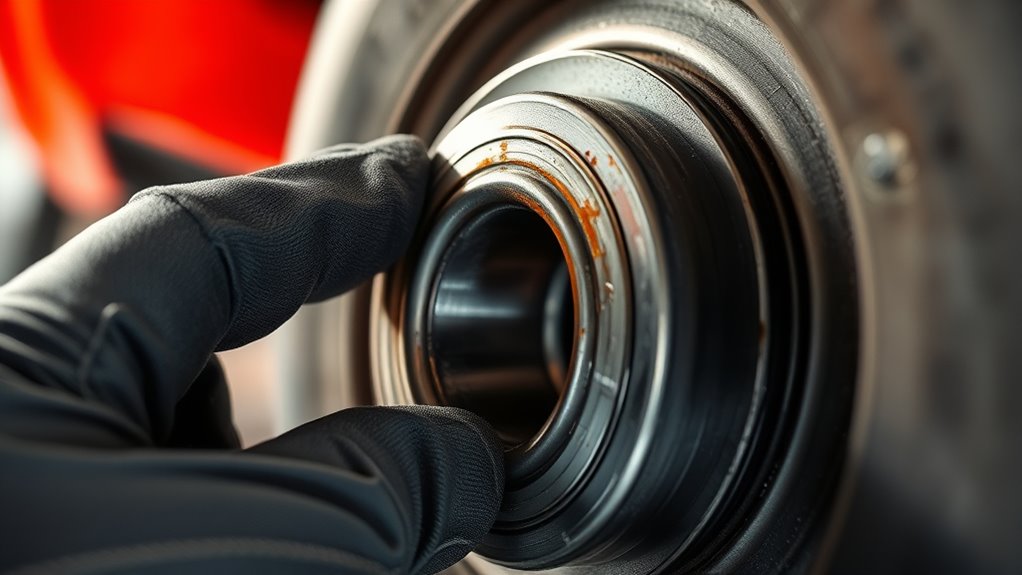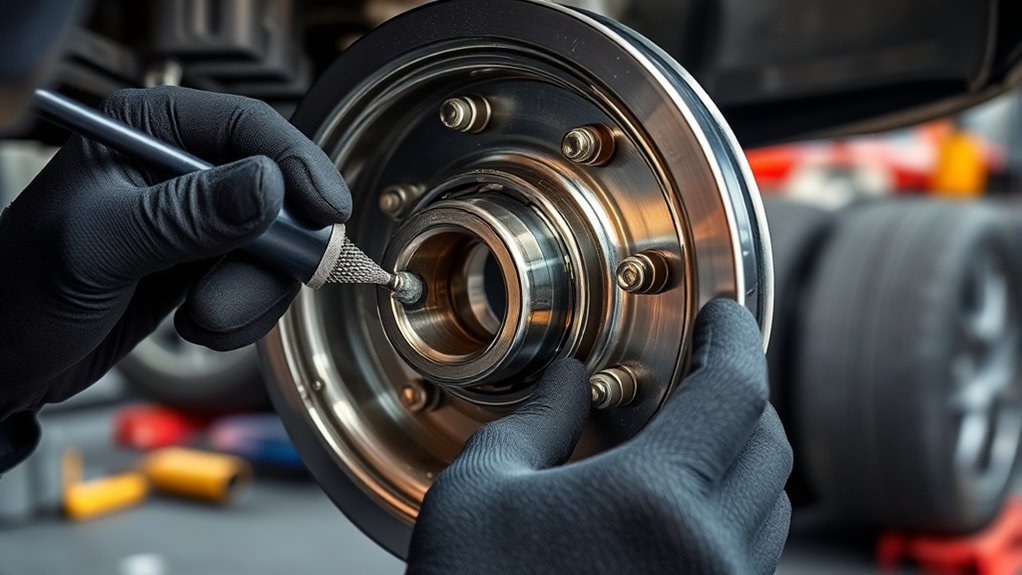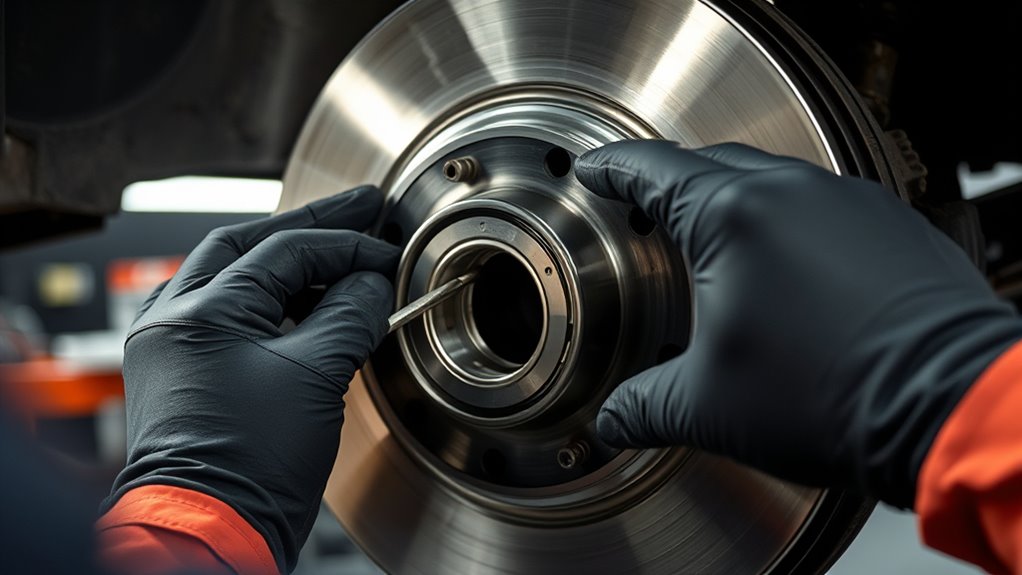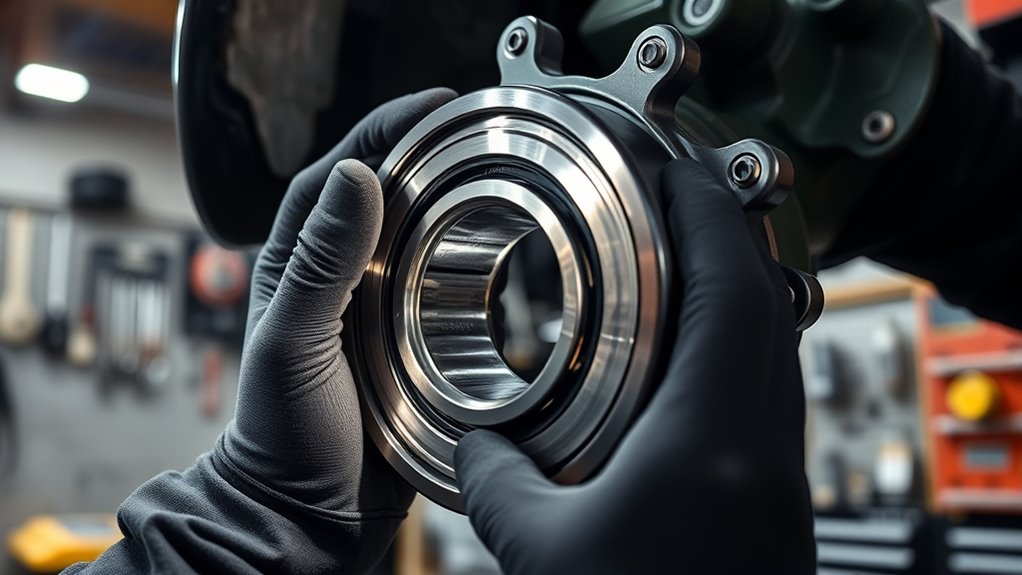Proper wheel bearing service is key to preventing speed-killing drag and keeping your vehicle running smoothly. Regular maintenance helps you spot signs of wear like noise, uneven tire wear, or vibrations early on. Ensuring your bearings are well-lubricated and replacing them when needed reduces friction and enhances fuel efficiency. Trusting experienced technicians and quality parts boosts safety and performance. Keep your vehicle in top shape by understanding these essential tips—more details await to help you stay ahead.
Key Takeaways
- Regularly inspect and replace worn or damaged wheel bearings to prevent increased rolling resistance and drag.
- Ensure proper lubrication of wheel bearings to reduce friction and maintain smooth rotation.
- Use high-quality, certified parts during service to minimize the risk of premature bearing failure and associated drag.
- Keep wheels properly aligned and balanced to reduce undue stress on bearings and prevent speed-killing drag.
- Have a professional perform routine maintenance and address any noise, vibration, or uneven tire wear promptly.
Understanding the Role of Wheel Bearings in Your Vehicle

Wheel bearings are essential components that allow your vehicle’s wheels to rotate smoothly and efficiently. They support the weight of your vehicle while enabling the wheels to spin freely with minimal resistance. Located between the wheel hub and axle, wheel bearings reduce friction and wear, ensuring a smooth ride. Properly functioning bearings help maintain alignment, improve handling, and prevent uneven tire wear. They also absorb shocks from road irregularities, protecting other suspension components. Regular maintenance and timely replacements keep these bearings in excellent condition, ensuring your vehicle operates smoothly and reliably on every journey. Understanding their role helps you recognize the importance of proper wheel bearing care. Additionally, degraded wheel bearings can increase rolling resistance, leading to decreased fuel efficiency and potential safety hazards.
Signs That Indicate Wheel Bearing Problems

When wheel bearings start to fail, several clear signs can alert you to the problem before it worsens. Recognizing these signs early can save you from costly repairs and dangerous driving conditions. One common indicator is a persistent noise coming from the wheel area, especially when turning or accelerating. You might also notice uneven tire wear or a feeling of looseness or play in the wheel. Additionally, you may experience vibrations or a grinding sensation while driving. These symptoms suggest the bearing is wearing out or damaged. Proper headphone usage can help stay alert to unusual noises that might indicate other vehicle issues.
The Importance of Regular Wheel Bearing Maintenance

Regular wheel bearing maintenance plays a vital role in keeping your vehicle running smoothly and safely. When you neglect this upkeep, your bearings can wear out faster, leading to uneven tire wear, increased fuel consumption, and potential safety hazards. Routine inspections allow you to catch early signs of damage before they escalate, saving you money and preventing breakdowns. Proper lubrication and timely replacement reduce friction, ensuring your wheels spin freely and efficiently. Consistent maintenance also extends the lifespan of your wheel bearings, avoiding costly repairs down the line. By making wheel bearing checks a regular part of your vehicle care, you improve overall performance and reduce the risk of sudden failures that could compromise your safety on the road.
How Proper Service Enhances Performance and Safety

Proper service of your wheel bearings guarantees that your vehicle maintains peak performance and safety on the road. When your bearings are well-maintained, you’ll experience smoother handling, better fuel efficiency, and reduced risk of sudden failures. Proper lubrication and timely replacements prevent unnecessary friction, which can cause overheating and damage to other components. This directly impacts your safety, as it reduces chances of wheel lock-up or loss of control. Regular service also ensures early detection of worn or damaged bearings, preventing breakdowns. Additionally, maintaining wheel bearing health can contribute to overall vehicle longevity and optimal performance.
Tips for Choosing the Right Wheel Bearing Service Provider

Choosing the right wheel bearing service provider is essential to ensuring your vehicle gets reliable and quality maintenance. Look for technicians with proper certifications and experience in wheel bearing repairs. Check reviews and ask for recommendations to gauge their reputation. A reputable provider uses quality parts and offers clear warranties, showing confidence in their work. Avoid shops that give vague estimates or pressure you into unnecessary services. Communication is key—ensure they explain the process and answer your questions thoroughly. Price is important, but don’t choose solely based on low costs; quality work saves you money in the long run. Trust your instincts; if something feels off, seek a second opinion. Properly selecting a skilled provider helps prevent future issues and keeps your vehicle running smoothly. Additionally, inspecting Vetted – Halloween Product Reviews can provide insights into reliable providers or accessories related to vehicle maintenance themes.
Frequently Asked Questions
How Often Should Wheel Bearings Be Replaced for Optimal Performance?
You might wonder how often to replace wheel bearings for peak performance. Generally, you should inspect them every 30,000 to 50,000 miles, and replace if you notice noise, vibration, or roughness. Regular maintenance helps prevent issues that can lead to more serious damage. If you drive in rough conditions or on rough roads, consider inspecting them more frequently. Staying vigilant ensures your vehicle runs smoothly and safely.
Can Driving Style Affect Wheel Bearing Longevity?
Your driving style definitely impacts wheel bearing longevity. If you frequently accelerate hard, brake suddenly, or take sharp turns, you put extra stress on the bearings. Aggressive driving causes more wear and tear, which can lead to earlier failure. To extend their lifespan, drive smoothly, avoid harsh maneuvers, and keep your vehicle well-maintained. This way, you reduce unnecessary strain, helping your wheel bearings last longer and perform better.
What Are the Cost Differences Between Various Wheel Bearing Brands?
Imagine you’re shopping for a new set of wheels, and the brand choices feel like steering a maze. The cost varies widely—premium brands often cost more upfront but offer longer life and better performance, while budget options save you cash initially but may need replacing sooner. Your driving habits, vehicle type, and quality expectations influence your choice. Weigh the long-term savings against initial expenses to find the best fit for your needs.
Are There Eco-Friendly Options for Wheel Bearing Services?
You might wonder if eco-friendly options exist for wheel bearing services. Yes, some shops use biodegradable lubricants and environmentally friendly cleaning products that reduce harmful waste. You can also choose bearings made from sustainable materials or brands focused on eco-conscious manufacturing. By asking your mechanic about these options, you help promote greener practices while ensuring your vehicle stays in top shape. Eco-friendly choices are becoming more accessible and effective.
How Does Wheel Bearing Maintenance Impact Overall Vehicle Resale Value?
Your vehicle’s resale value benefits from regular wheel bearing maintenance because it keeps the wheels functioning smoothly. When you maintain your wheel bearings properly, you reduce the risk of costly repairs down the line, which buyers appreciate. Well-maintained bearings also show that you’ve taken good care of your car, boosting its overall appeal. So, staying on top of this service can help you get a better price when it’s time to sell.
Conclusion
Regularly servicing your wheel bearings isn’t just about avoiding costly repairs; it could actually improve your driving experience. Some believe that well-maintained bearings can boost fuel efficiency and even enhance your vehicle’s speed. While these claims have some scientific backing, the real truth is that proper maintenance keeps you safer on the road. Don’t wait for warning signs—stay proactive and choose a trusted service provider to keep your wheels spinning smoothly and safely.









